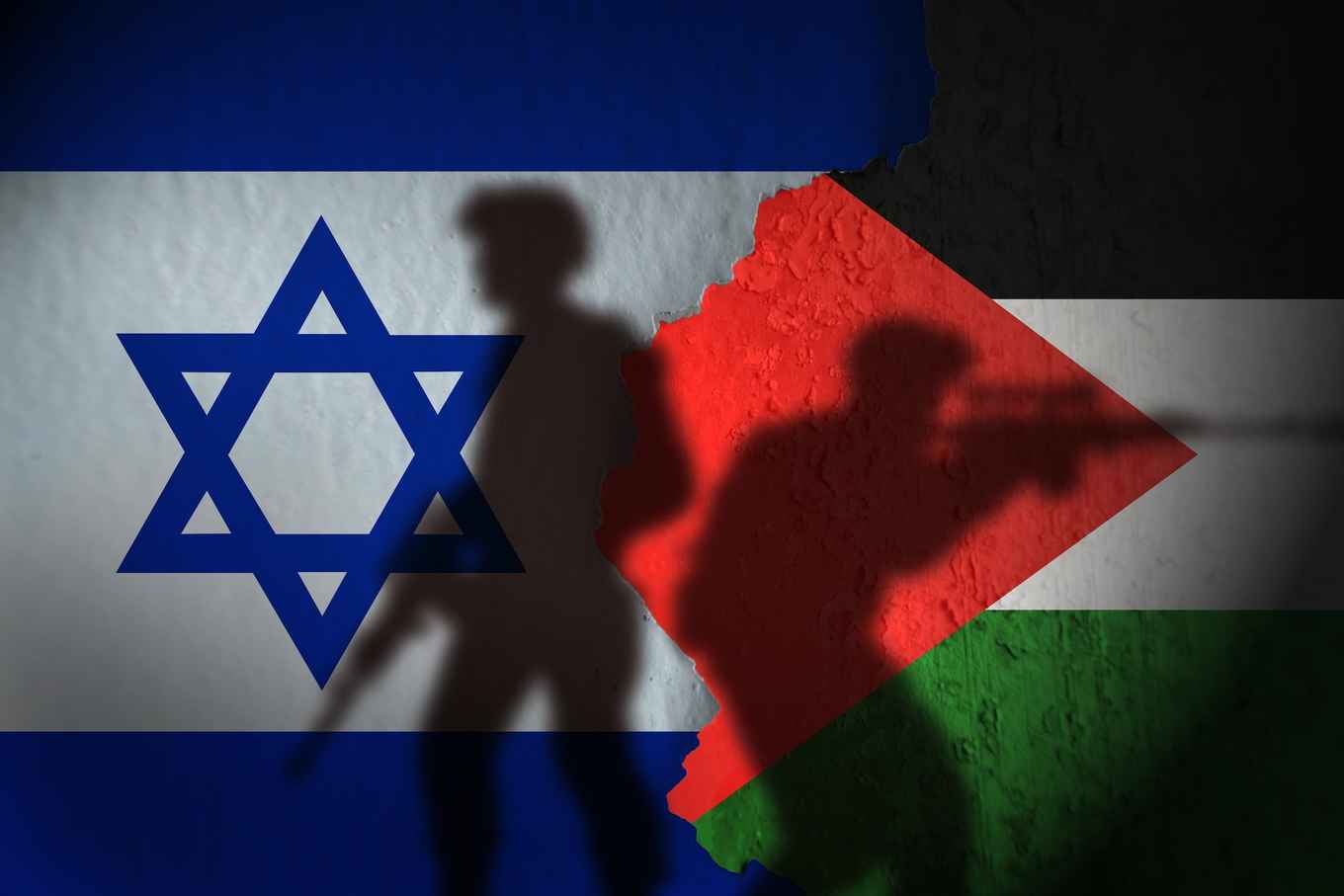10 questions about the armed conflict between Israel and Hamas
Amsterdam Law School
19 October 2023

1) How far can Israel legally go to get the hostages back from Hamas?
Marten: 'Israel can, on the basis of self-defense, stop an attack by Hamas and prevent new imminent attacks. But the force they deploy must be proportional and aimed at stopping an attack and getting their citizens back: no more than that.'
André: ‘A common argument is indeed that Israel can free hostages based on the right of self-defense. I strongly question that. Of course Israel has a right to defend its population and seek to free hostages. But this is not an exercise of the right of self-defense under art 51 of the UN Chater, because the hostages are in territory that, despite Israel’s disengagement, still can be equated with occupied territory.'
2) Does Israel's response to Hamas violence comply with the law of war?
Marten: ‘First of all, Hamas' killing and taking civilians hostage was a serious violation of International Humanitarian Law (IHL). But Israel also violates IHL. Closing off Gaza is not consistent with that body of law. They are obliged to let humanitarian goods through for the population. They are not doing that so far. Israel displca persons in Gaza for of their own safety or when there is an imperative military necessity to do so. But that must be done properly; people must be safe.’
André: ‘Agreed, but let’s emphasize that we often have limited information. Sometimes we can make initial judgments based on limited information, but we should not be too quick to make strong judgments based on limited information about complex factual situations.'

No matter how bad Hamas' crimes are, that is no justification for Israel to violate the law of war itself.
3) Do Israel and Hamas both have to abide by the law of war?
Marieke: ‘Yes, both of them do. No matter how bad Hamas' crimes are, that is no justification for Israel to violate the law of war itself. Not just because that's the law, but also because humankind created those rules based on centuries of experience. If countries do not abide by them, injustice keeps piling on injustice, and you only sink further into a spiral of violence.’
4) What are the consequences of violating the law of war?
Marieke: ‘The International Criminal Court (ICC) has jurisdiction over the international crimes committed in the Palestinian territories because Palestine, unlike Israel, is a state party to the ICC and had previously asked the ICC to investigate the situation. That mandate now extends to current crimes as well. The ICC not only investigates crimes in Gaza, but also crimes committed by Hamas in Israel. Other countries can prosecute suspects if they are on their territory. And because international crimes in principle do not have a statute of limitations, that can also mean that if someone turns up somewhere in the decades to come, another country may decide to still prosecute them then and there. You do need sufficient evidence, because without evidence there is no criminal case.'
Marten: ‘It is important to bring people to justice. If they don't comply with the law and no consequences follow, that undermines the law and that is worrisome.'
André: 'It also is relevant that other states have duties when international humanitarian law is violated. They are obliged to help ensure that Israel and Hamas abide by the law. The Netherlands should actively promote that.'

If they don't comply with the law and no consequences follow, that undermines the law and that is worrisome.'
5) What does this duty of the Netherlands look like in practice?
André: ‘An obvious way to implement this duty is exerting diplomatic pressure. The Netherlands has good diplomatic contact with the Israeli authorities, but currently not with Hamas. Hamas is on the terror list and is not accepted as a speaking partner. This proves the point that it is important, - no matter how bad the regime's crimes are – to remain in dialogue, because it helps to ensure that justice is done. Also, international organizations can play an important role lot. The UN's International Commission of Inquiry investigates war crimes and should be given the means and support to do so. It is also very important that the member states enable to United Nations Security Council to unanimously call for a cease-fire and comes up with a political solution.’
6) Are the consequences grave enough to follow the rules of IHL or is it a paper tiger?
Marten: ‘In a lot of cases, countries abide by IHL, and if they don't, it is in the news. So IHL is definitely not a paper tiger. Law plays an important role in legitimacy of what you do. If Israel says it wants to abide by the law, then you can hold them accountable if that doesn't happen.’
7) How do you view the Spanish minister's statement that Prime Minister Netanyahu should be brought before the International Criminal Court for 'planned genocide'?
Marieke: ‘It is difficult to determine whether this is genocide because then the question has to be answered whether Netanyahu wants to exterminate the Palestinians or "merely" collectively punish, expel, or deter. There doesn’t seem to be enough information yet to answer that question. But cutting off an area from drinking water and humanitarian aid and dehumanizing language are very worrisome signals. You can say "these are just words” but make no mistake: this is about dehumanizing people, with the goal of lowering the threshold to kill them. It is an intentional policy.’
Marten: ‘Dehumanizing language is very worrisome. The use of that language is not criminal per se, but it plays a very important role in law and whether it is respected or not.'
André: ‘The argument that there may be genocide is also important because genocide is a ground to bring a case before the International Court of Justice. The Genocide Convention obliges all states, including the Netherlands, to prevent genocide. Given the current signals, that may already entail obligations for other states - and they go just a bit further than when it comes to war crimes.'
8) In what ways can law contribute to a solution in this war?
André: ‘From a larger perspective, the prosecution of a few people who gave orders is only a small component. Legally, the basis for a solution is the combination of Israel's right to sovereignty as well as the Palestinian people's right to self-determination. The best scenario will still be a fast recognition of Palestine and a two-state solution, but that is ultimately a political choice’
Marieke: ‘Law can contribute to that, though. Currently the International Court of Justice is looking into how the occupation by Israel affects the human rights of the Palestinians. The hope is that parties will soon comply with the advice that this highest judicial body in the world will give on this matter, and that other countries will also actively enforce this advice with, for example, political pressure and possible sanctions.'

I think we have a responsibility to contribute to debate and the clarification of the debate
9) This war raises many emotions and people are easily judged on their word choices. Are you reserved when questions are asked about this?
André: ‘We are talking about our knowledge as academics. I don't feel restricted in that. I think we have a responsibility to contribute to debate and the clarification of the debate.'
Marten: ‘I agree. I haven't had any hate reactions to media appearances yet, but I do keep in mind that it can happen. You see it so often with this topic. But I think it's important to keep explaining that there are rules, even when war is being waged.’
10) Students and staff are calling on the UvA to take a stand. Is it also up to the faculty to speak out?
André: ‘The law school, like the university, is a place where employees and students with diverse views should be able and be free to speak out. This is especially important in situations where there is a diversity of views. A number of staff have already been critical of violations of international law by Hamas and by Israel and have explained how law can contribute to solutions. But this is not a role that faculty itself should play. That also corresponds with the views expressed by Geert ten Dam, chairman of the UvA's Executive Board, in an interview in the Volkskrant.’